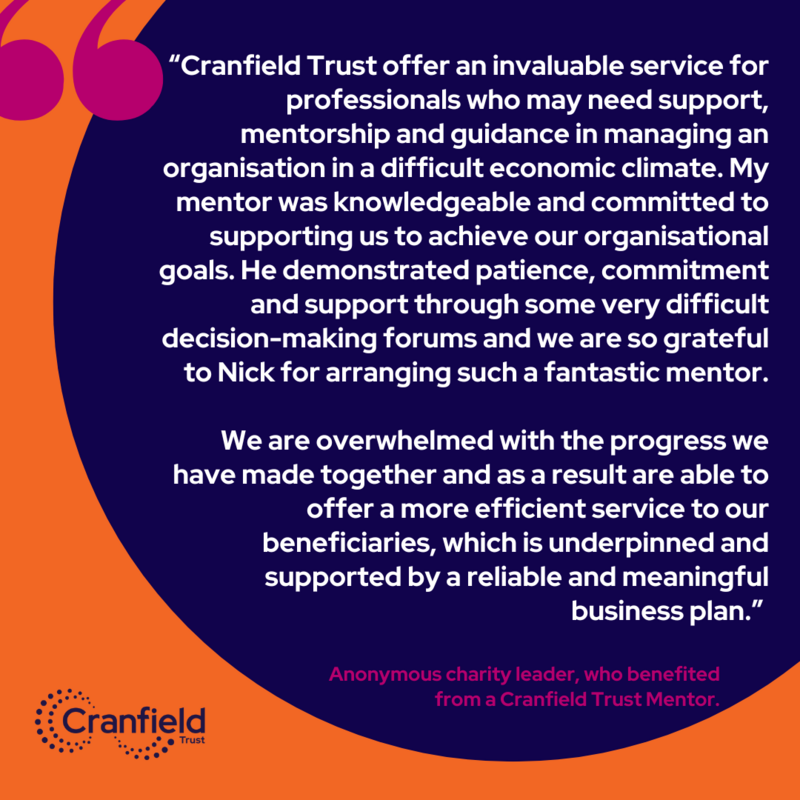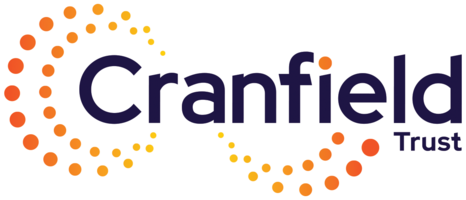Mentoring for charity leaders - Start your journey of discovery
Cranfield Trust Mentoring is a powerful tool for charity leaders looking to develop personally and professionally. Whether to advance your career, or grow your skills as a leader, a mentoring partnership can be a rewarding and beneficial experience.
A quality mentoring partnership will help you to broaden your horizons, expand your point of view and encourage you to consider new ways of doing things.

Who is Cranfield Trust Mentoring for?
If you're a charity leader looking to develop your management skills, improve your performance and build your confidence as a leader, our free mentoring programme is the perfect solution for you.
To apply for our mentoring programme, you must be a leader within a registered charity or CIC that has a primary purpose of addressing human welfare issues in England, Scotland or Wales.
Why should I choose a Cranfield Trust Mentor?
All our volunteer mentors are highly experienced professionals from the commercial sector, who give their free time to mentor charity leaders. They are selected as mentors because of their expertise and professional knowledge - so you can be confident they have the skills and experience to help you achieve your goals.
How does Cranfield Trust Mentoring work?
You will be carefully matched with one of our skilled volunteer mentors, who will guide you through your personal mentoring journey. Your mentor will take time to listen and understand the outcomes you want to achieve. During the course of several 60-90 minute sessions, over a period of months, your mentor will work with you to achieve your objectives.
Your mentor will help you think through issues that are important to you; offering you advice based on experience of their own successes and challenges. Working together you will explore solutions to enable you to fulfil your performance goals; in turn helping to improve your organisational outcomes and ultimately those of your charity's beneficiaries.
Cranfield Trust follows a formal, structured mentoring pathway, focusing on outcomes designed to boost your confidence and increase your learning and resolve.

Is it confidential?
In most cases all conversations that take place during the course of your mentoring partnership will remain private; with the exception of those relating to a duty of care, legal obligations or ethical reasons.
Although your charity's trustees and colleagues may know you have a mentor, protocols regarding sharing information with third parties e.g. your line manager, will be agreed upon with you at the start of your mentor relationship.
Is mentoring the same as counselling?
Counselling is a different specialist skill to mentoring and is not something Cranfield Trust can provide. If you need support with mental health, please visit: www.mind.org.uk/information-support.
An interview with Professor David Clutterbuck
In an Interview with Cranfield Trust Head of Operations Alice Dabrowska and Mentoring Coordinator Emilia Ufir-Kaparaboina, Professor Clutterbuck answers some important questions about mentoring:
Hear from one of our Mentors
Cranfield Trust Mentor Karen Plum speaks to Mentoring Coordinator Emilia Ufir-Kaparaboina about why she chooses to mentor with us and how she feels mentoring can help small charities.
Code of Conduct
We adhere to the Code of Conduct for Mentors and Mentees developed by Professor David Clutterbuck:
The purpose of a Code of Conduct is to provide a guideline on what is acceptable and non-acceptable behaviour within a mentoring relationship. The suggested Code below applies both during and after the relationship –the obligations of both parties continue once the relationship has achieved its purpose.
1. The mentoring relationship is one, which depends on mutual trust. Neither party may discuss the content of their conversations with other persons –including the mentee’s line manager –without express permission of the other party. The sole exception is in the specific context of professional mentor / mentee supervision, with a professional supervisor or with the programme manager.
2. Mentor and mentee will be as open as possible with each other at all times. This includes telling each other when they are uncomfortable about some aspect of the relationship.
3. It is understood that, at times, mentor or mentee may not be able to divulge certain information that they hold in confidence. Equally, if they do divulge information to each other in confidence, both parties must respect that confidence.
4. The responsibility to review the relationship is shared between mentor and mentee.
5. Mentor and mentee both have a duty of care to each other. They also have a duty of care to the organization. They should not do anything, which damages the reputation of the company or brings harm to other people.
6. Mentor and mentee both have an obligation to use the relationship wisely. This includes preparing for mentoring meetings and respecting each other’s time.
7. Should any conflicts of interest or other ethical issues arise, mentor and mentee should first acknowledge and discuss these, then, if appropriate, seek guidance from the programme manager or mentor supervisor.
8. Unless specified within the programme purpose, mentors should not take on the role of sponsor for the mentee, and mentees should not expect them to do so.
9. Mentoring is a “professional friendship”. It is inappropriate for the relationship to become physically intimate. Mentor and mentee have a mutual responsibility to avoid such situations during the course of the formal relationship, or to withdraw from the mentoring relationship should it be in danger of becoming physically intimate.
10. Mentees acquire a personal obligation to pass on the gift of mentoring.
© David Clutterbuck, 2014
If you're interested in joining other charity leaders who have benefited from Cranfield Trust Mentoring, get in touch with us today and start your journey of discovery.



